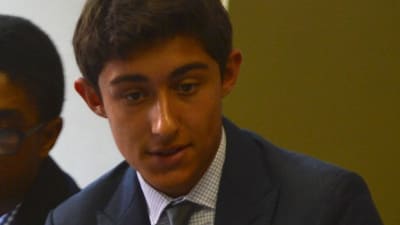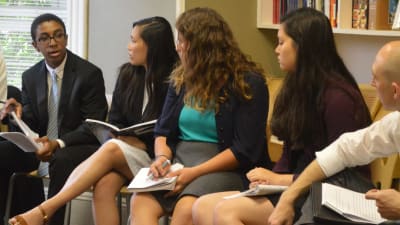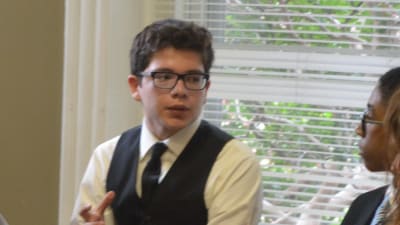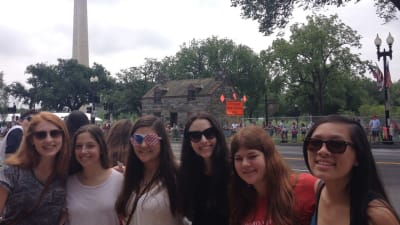Ethics Mash-up: Summer 2015 does three case studies at once
During the semester, we tend to end one case study before beginning another. In the summer, when students can keep more in their heads and when opportunities can be had at any moment, we like to mash-up our subjects. This allows for students to make fascinating cross-cutting connections. During our first week together, we began three case studies: an introduction to ethics, the Rwandan genocide, and the Israeli-Palestinian conflict.
The Infamous Skittles Scenario is an early SEGL rite-of-passage. A hands-on state-of-nature simulation that has students scurrying after plastic bags of candy and howling with delight or dismay at 3×5 “Chance” cards, the simulation is an entertaining introduction to ethical decision making. (What would you do, after all, if there were no rules and limited resources? Would you use that gun you found? Help out a suddenly-blind friend? Lie? Join a makeshift band of mauraders?)
This is how we started our first case study on Monday morning, and the conversation that followed was fun and pensive. We then gave the students an introduction to classic Western ethical theory–Aristotle, Kant, and John Stuart Mill–a 15 minute lecture stretched into more than 30 because of all the good questions that students interjected.
On the days that followed, we met with two leaders confronting real-life ethical decisions in their work: George Laudato, the former head of USAID’s Middle East operations (imagine deciding how to provide humanitarian assistance during the Arab Spring!), and State Department Attorney Gabriel Swiney (imagine advising the State Department on legal options during the civil war in Libya!) Both speakers spoke in stories and encouraged student participation (Swiney led students on a step-by-step “Choose Your Own Adventure”), staying past their scheduled time slot because the students were so engaged.
On Wednesday night, we began our second case study by showing the students Ghosts of Rwanda. Ghosts, a PBS Frontline documentary from 2004, documents the 1994 Rwandan genocide and the world’s response (or lack of a response), and examines many of the ethical choices made during the conflict. The discussion that followed was thoughtful and forward-looking, and continued long after the official end of the conversation.
Three of the leaders featured in the documentary are longtime SEGL guest speakers, and we met with the first of them on Thursday. Carl Wilkens is a former Adventist missionary who was the head of his church’s relief mission in Rwanda during the genocide. He was the only American to stay behind in 1994, and is most well-known for (among other acts) saving an entire orphanage from Interahamwe machetes. To SEGL graduates, he is a winner of our coveted “Golden Mug” award, which our graduates give to the speaker who has made the biggest difference in their lives.
Wilkens videoconferenced with the students from Washington State, the home base of World Outside My Shoes, his genocide prevention NGO). The students asked him a wide range of questions–some personal, some political–and listened intently as he carefully and thoroughly addressed each one.
(Carl will become an honorary SEGL teacher this summer when a group of students visits Rwanda with him. To learn more about the trip, visit our SEGL in Rwanda page. He will stop by DC–and SEGL–on his way there.)
On Friday, we began our third case study, the Israeli-Palestinian Conflict, with an overview of the dispute. The dispute is arguably the most intractable of our times–a disagreement so fraught with anger and misunderstanding that many question every word, every historical event, every intention presented. And yet the problem remains, and will remain until we have leaders–perhaps including a few SEGL graduates–who conquer it.
As if all that were not enough, we made the first of (at least) three religious visits to classic DC sites: the Islamic Cultural Center and mosque. Later we will visit the Sixth and I synagogue and the National Cathedral. Our hope is that these visits will help inform many of the topics we study, as well as our own conversations with each other.
There is more to come on each of these case studies–in fact, as I write, the students are visiting the Israeli Embassy!
Meanwhile, this weekend there were plenty of opportunities for patriotism despite a nasty monsoon-like rain on the morning of the 4th. (It quite literally rained on the parade…) Luckily the weather cleared in time for a spectacular 20-minute fireworks show which the students watched from the steps of the Federal Reserve, just off of the National Mall and a block from the epicenter of the colorful explosions. (There were even fireworks in the shape of U…S…A…) And on Sunday we watched the U.S. soccer team win the World Cup with a 5-2 victory over Japan!
We’ll continue overlapping our case studies this week–stay tuned!

















